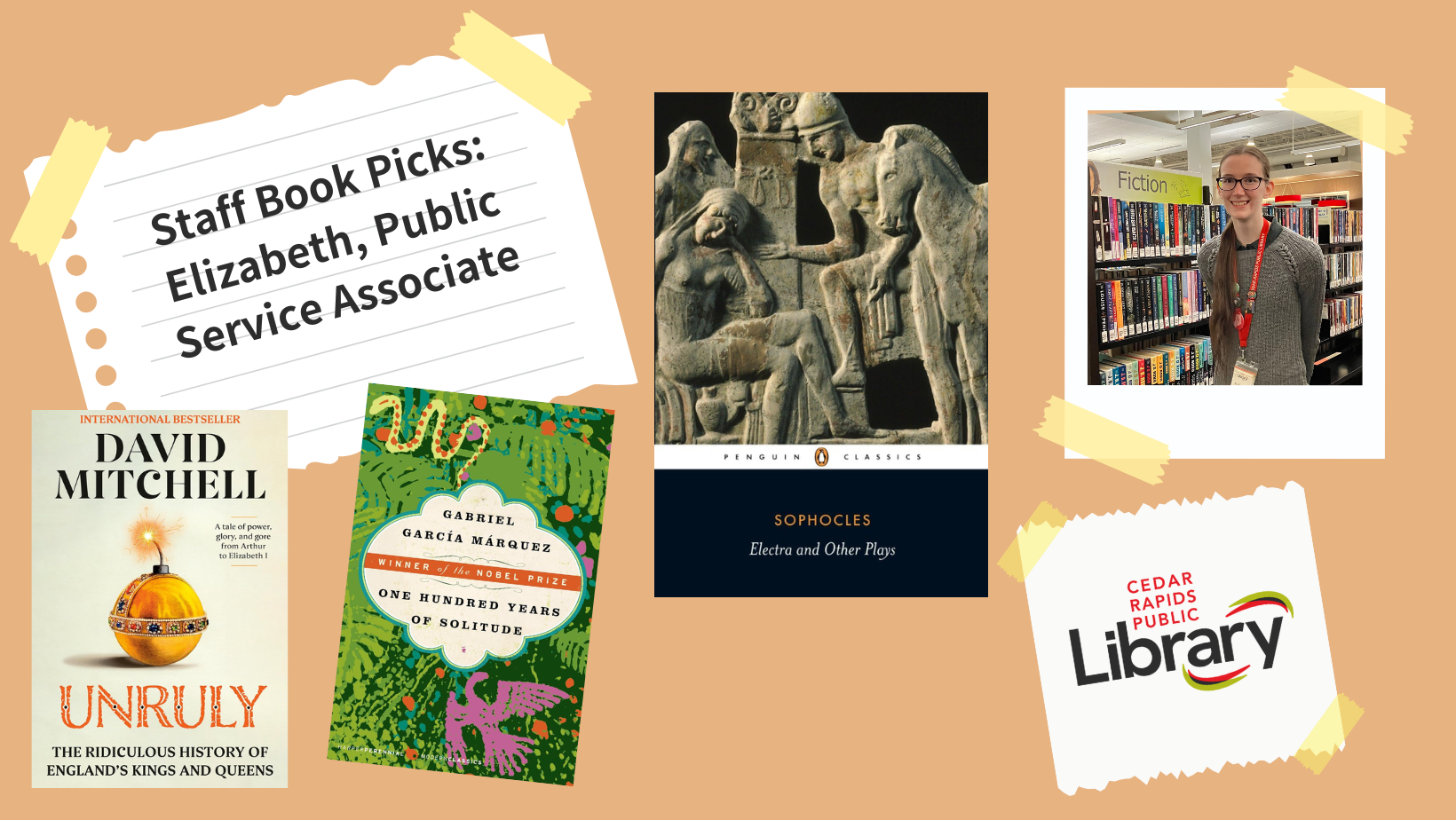
Jan. 6, 2025 – The Cedar Rapids Public Library is made possible by our incredible staff. And we are staffed by book lovers. To celebrate the people who keep our library running, we're highlighting different staff members and books they love.
Elizabeth is a Patron Service Associate working primarily at Ladd Library. She started working at the library in 2017. As a Patron Service Associate, Elizabeth does a bit of everything, from shelving books to making library cards and helping patrons find materials and make copies.
“I like so many things about my job,” she said. “I started at the library as a Shelver, so I take particular pride in getting all materials shelved by the end of the day. I also like being able to help a patron solve a problem they had been struggling with or find a book they really wanted. I’ve worked at the library for seven years and enjoyed almost every minute of it.”
"Electra and Other Plays" by Sophocles
When books inspired by Greek mythology are as popular as they are, I’m surprised that the original Greek tragedies aren’t being read more often. About 2,500 years before Jennifer Saint wrote "Elektra," the ancient Greek playwright Sophocles wrote his version of the story of how Agamemnon’s children Electra and Orestes plotted to avenge their father’s murder. The three other plays included in the book ("Women of Trachis," "Ajax," and "Philoctetes") respectively describe how Heracles’s wife accidentally killed her husband, Ajax reacted to being constantly seen as second best, and Philoctetes was convinced to rejoin the Greeks at Troy after they abandoned him on a deserted island for ten years. If you are interested in Greek mythology or recognize any of those names, I highly encourage you to give Greek tragedy a try: it’s been one of my favorite genres since high school.
"The Aeneid" by Virgil
If you think of the Roman empire five times a day or wish Homer wrote another book to go with his "Iliad" and "Odyssey," Virgil’s "Aeneid" is the book for you. It follows the Trojan Aeneas from the fall of Troy to his arrival in the land of the Latins, where his decendents (as he learns on a visit to the underworld) will one day build the city of Rome. Written in the time of Augustus, the Aeneid foreshadows the rise of the Caesars, provides a mythological backstory for Rome’s rivalry with Carthage, and keeps the action going until the very last line.
"The Long Winter" by Laura Ingalls Wilder
The "Little House on the Prairie" series has been one of my favorites since I was in second grade. I have reread these books more than any others I own, and while I have gone back and forth many times over the years, my current favorite is "The Long Winter." Anyone who remembers the COVID-19 pandemic will be able to relate to teenage Laura’s experiences during the winter of 1880-81, when a series of severe blizzards canceled school and limited resources in her small South Dakota town. Laura’s future husband Almanzo Wilder plays a larger role in this book than in previous books, in scenes both comedic and heroic. The library has all nine books in Laura Ingalls Wilder’s original series, and I would be very happy to see someone checking them out.
"One Hundred Years of Solitude" by Gabriel García Márquez
Imagine a Greek tragedy set in late 19th-mid 20th century Colombia and you’ll start to get a feel for "One Hundred Years of Solitude." I originally read this for a college course that highlighted magical realism in multicultural literature, but I still think about this book two years later. It follows the Buendía family across multiple generations through circuses, civil wars, brushes with death personified, and banana republics. The imagery throughout is sometimes gruesome but always vivid, and there are multiple specific scenes that I have found myself envisioning again and again. The family tree at the beginning of the book helps keep characters with the same name straight.
"Unruly: The Ridiculous History of England's Kings and Queens" by David Mitchell
I do occasionally read books written in this millennium, although the subject matter of this book is medieval rather than modern. David Mitchell (not the author of "Cloud Atlas") highlights English (not British) monarchs from Aethelberht of Kent to Elizabeth I and provides humorous anecdotes about famous figures such as Alfred the Great and Richard III alongside serious reflections on, for example, the impossibility of really knowing what these historical figures were actually like. If you have an interest in history, regardless of your prior knowledge of the period, you will find something of interest in this book.